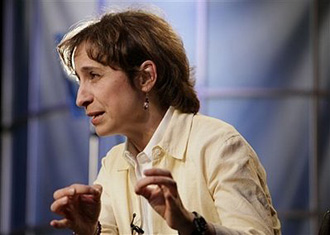
|  |  |  Editorials | Issues | May 2009 Editorials | Issues | May 2009  
Ex-President's Knock at Successor Shakes Mexico
 E. Eduardo Castillo - Associated Press E. Eduardo Castillo - Associated Press
go to original


| | Mexican journalist Carmen Aristegui speaks during an interview in Mexico City, Thursday, May 14, 2009. Former Mexican President Miguel de la Madrid has retracted an accusation that his successor tolerated corruption, saying he was confused when he made the comment in an interview with Aristegui. (AP/Gregory Bull) |  |
Mexico City – It's an unwritten rule in Mexico, followed by presidents for decades: Never criticize past or present leaders.

Former Mexican President Miguel de la Madrid broke that rule this past week — if only briefly — when he accused his successor Carlos Salinas of corruption.

"He promoted his family's huge corruption," the former president offered, surprising even his interviewer with his bluntness. Salinas, he said, robbed from a secret government fund and turned a blind eye when his brother profited from government contracts and had contacts with drug traffickers.

Salinas "committed serious errors, very serious. The worst: corruption," said De la Madrid, who chose Salinas as his successor under a system that long gave presidents nearly unlimited power until they left office.

The interview roiled Mexico's political class — and the ex-president's quick retraction caused further speculation about political turmoil. After all, De la Madrid remains a stalwart of the Institutional Revolutionary Party, or PRI, someone clearly in the know about back-room wheeling and dealing at the height of the party's 71-year hold on Mexico.

Both De la Madrid and Salinas assumed the presidency after jobs in Mexico's economic bureaucracy and both championed free-market reforms that culminated in the 1994 free trade agreement with the United States.

The two are also tied and tainted by the disputed 1988 election. Many Mexicans believe De la Madrid's administration rigged the count to cheat a maverick leftist of victory and gave the presidency to Salinas.

While Salinas has been outspoken in defending his record and in denying past allegations of corruption, De la Madrid has kept a low profile as head of a state publishing company.

De la Madrid made the allegations on April 15, but did not retract them until hours after they aired, claiming he had been "weak and confused" while being interviewed by journalist Carmen Aristegui on MVS Radio. Salinas wrote a letter accusing Aristegui of taking advantage of an ailing, 74-year-old man. De la Madrid, who served from 1982 to 1988, suffers from respiratory problems and has been in poor heath.

Several Mexican newspapers reported that top PRI officials drafted the retraction that De la Madrid published as a paid ad in national newspapers on Thursday.

Opposition politicians gloated. Leftist Andres Manuel Lopez Obrador, who narrowly lost the 2006 presidential election, said De la Madrid has exposed "the whole pigsty" of Mexican politics.

For many political observers, the retraction was a sign of how little has changed in Mexico nearly a decade after the PRI finally was voted out of power. Many Mexicans saw it as evidence that the PRI has yet to come to terms with democratic transparency and free speech.

Even so, "nothing can erase the impact of his insinuations," Joaquin Lopez-Doriga, a columnist for the Milenio newspaper, wrote Friday.

Before the PRI lost power in 2000, it was known for keeping its politicians in check. Former presidents were supposed to vanish into obscure jobs after handing over their vast powers to a hand-picked successor ratified by often-dubious elections.

Salinas, who ruled from 1988 to 1994, left office a popular man, but the collapse of Mexico's economy weeks later demolished his reputation and revelations that his brother Raul had large bank accounts abroad led to domestic and international criminal investigations. Raul Salinas later served 10 years in prison for the killing of his brother in law, a PRI party leader Jose Francisco Ruiz Massieu, before being exonerated.

Aristegui said she did the interview for a book and delayed its release because news about swine flu dominated the airwaves.

Carlos Salinas, who is abroad, could not be reached for comment.

George Grayson, a Mexico expert at the College of William & Mary in Virginia, said he thinks De la Madrid was telling the truth the first time.

"He's in failing health and I think he wanted to set the record straight," he said. "But there was a lot of pressure brought to bear on him. It has been an unwritten rule with the traditional PRI that a former president does not speak ill of his successor, in return for which his successor did not launch a witch hunt about the real or perceived transgressions of his predecessor."

The controversy could be providential for President Felipe Calderon's PAN party, which trails a resurgent PRI in polls ahead of July's legislative elections. Many voters are angry about the violence that has increased during the government's crackdown on drug cartels.

"All you need is a food fight between notables in the PRI to underline the contention that the PRI hasn't changed one iota, that it's still the corrupt crowd that ruled the county for 71 years," Grayson said. |

 |
|  |



